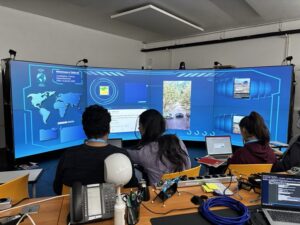Soutenance de thèse
Laure Baratgin
LMD
L’hydroélectricité à l’épreuve du changement climatique : modélisation couplée des systèmes hydrologiques et électriques pour l’adaptation et l’atténuation
Résumé
French hydropower production is expected to undergo major changes in the coming years. On the one hand, global warming intensifies seasonal precipitation contrasts and increases evaporative demand, altering river flows and, consequently, the water resources available for hydropower plants. On the other hand, the growing integration of variable renewable energies, encouraged by CO2 emission mitigation policies, changes the flexibility requirements of the electrical system. Finally, the management of hydropower reservoirs also depends on the evolution of other water uses.
In this thesis, we propose an integrated modeling approach to simulate and quantify these different effects and their interaction. Our approach is based on the coupling of a land surface model (LSM) and a power system optimization model (PSM), enabling us to jointly represent the constraints related to climate and the electrical system. We represent the multipurpose operation of hydropower reservoirs in the LSM and use the power generation time series simulated by the PSM as a target to guide reservoir operations. Conversely, the hydropower production constraints used in the PSM are defined based on LSM simulations.
We show that this integrated approach enhances both the representation of river flows in the climate model and of production dispatch in the PSM. Most importantly, it allows us to simulate the response of hydropower production to different scenarios of climate change and power system configurations. Regarding the future of hydropower production in France, we find a limited impact of climate change at the annual scale but more pronounced seasonal contrasts, with increased production in winter and decreased production in summer.
Besides, the integration of variable energy modifies the production pattern of reservoir power plants and increases the value of the flexibility provided by hydropower reservoirs. However, our study also highlights significant uncertainty in future production levels and electricity prices, linked to uncertainties in climate projections and the future cost of decarbonized thermal power plants.
Informations supplémentaires
Lieu
CIRED
45 bis, Avenue de la Belle Gabrielle
94130 Nogent-sur-Marne
Amphithéâtre du premier étage
Visio
https://cnrs.zoom.us/j/97304449450?pwd=rY5Qp5iy8BQFKHsjZ3OusrfciuYdih.1
Composition du jury
- Nathalie Voisin (Pacific Northwest National Laboratory, Rapportrice)
- Eric Martin (INRAE, Rapporteur)
- Sylvie Parey (EDF, Examinatrice)
- Anna Créti (Université Paris Dauphine, Examinatrice)
- Patrice Dumas (CIRAD, Invité)
- Jan Polcher et Philippe Quirion (Directeurs de thèse)






